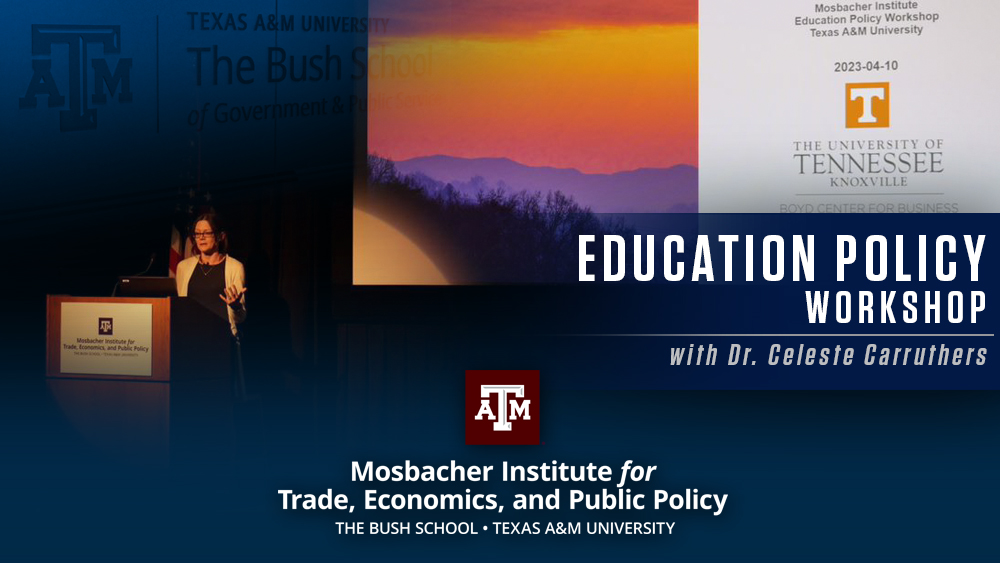
On April 10, 2023, Dr. Celeste Carruthers, labor economist at the Haslam College of Business at the University of Tennessee, presented an Education Policy Workshop on the topic “Community Colleges: Can They Be All Things to All Students?” at the George H.W. Bush Presidential Library and Museum.
Carruthers is the William F. Fox Distinguished Professor of Labor Economics in the Haslam College of Business at the University of Tennessee with a joint appointment in the Department of Economics and the Boyd Center for Business and Economic Research. Her research centers on education policy with crossovers into public economics, labor economics, and economic history. Her recent and ongoing projects examine the effect of financial aid on college choices, career and technical education, and the consequences of segregated schools in the early 20th-century United States.
Watch Community Colleges: Can They Be All Things to All Students?
Carruthers started her talk by providing a description of community colleges, who they serve, and their relationship with four-year institutions and the labor market. She noted that community colleges serve a variety of learners, from recent high school graduates to individuals who might be taking a fly-fishing course to learn a new skill. As a result, there is great diversity in the student body of community colleges across the country; most students do not attend classes full time, are over the age of 25, and are more likely to be working. She also noted historical and contemporary trends in community college enrollment in relation to labor market outcomes. While enrollment traditionally increases during unfavorable economic conditions, during the COVID-19 pandemic, community college enrollment dropped substantially. Carruthers also noted differences in community college student goals and their realization, highlighting the fact that only 14% of community college students who wish to obtain a BS/BA actually do so.
Carruthers spent the majority of the workshop overviewing several papers and current projects: “Career and Technical Education, Accountability, and Program Quality Indicators Under Perkins V,” “Way station or launching pad? Unpacking the returns to adult technical education,” “What Knox Achieved: Estimated effects of tuition-free community college on attainment and earnings,” and a current project “Free College Promises, High School Achievement, and College Enrollment.” With each paper or project, she provided a brief overview of the background and methodology before discussing the findings and implications. The biggest takeaways from her remarks involve the various broad functions community colleges serve. First, there were mixed results for dual high school/community college enrollment. For instance, there is mixed evidence on whether dual-credit/dual-enrollment brings college-level rigor to high school students. Next, there are concerning aspects surrounding transfer pathways for community college students. Namely, tuition-free community college is found to have inconclusive effects on bachelor’s degree attainment. Lastly, the effectiveness of community colleges relative to newer firm-based education, such as Tennessee Colleges of Applied Technology (TCATs), is unclear.
The majority of the questions following her talk explored the current literature and impact of tuition-free community colleges across the nation. Other questions delved into the impact of attaining both a certificate and associate’s/bachelor’s degree on labor outcomes.
Carruthers was generous with her time and expertise while in College Station. During the day, she also met with Bush School students interested in Education policy, visited an Education Policy class, and spent time with Texas A&M faculty with shared research interests.
The event was hosted by the Mosbacher Institute for Trade, Economics, and Public Policy at the Bush School of Government and Public Service at Texas A&M University. The Institute’s Education Policy Workshop series brings in noted academics who are invited to discuss their current research to increase the understanding of the research underlying current education policy.

